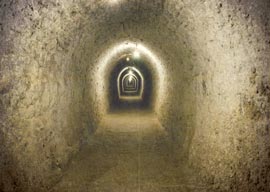
June 11, 2015

Source: Shutterstock
The goes 16 of us to geather 8 of us work and the other Reast in trenches till they have don their work then when we get Back to our bilet we have 36 hours of but it is very wet in the tunles it is very nasty work…
So Grandad, who was with a Royal Engineers unit, was digging “tunles.” Presumably the inspiration here was Petersburg. It’s a cliché, but”like most clichés”true, that these later stages of the Civil War prefigured WWI in many ways. Following Grant’s Overland Campaign southward and stopping at the battlefields, you notice how much trenchier the war got.
Certainly both sides of the WWI Western Front tried blowing up the enemy’s line, the allies most sensationally at Messines Ridge in 1917, when 21 mines were placed under German lines. Nineteen of them worked, and the allies broke through. (Says that link, with fine understatement: “Of the two mines which remained undetonated…the details of their precise location were mislaid by the British following the war, to the discomfort of local townspeople.” Discomfort?)
Was Grandad digging tunnels for mines? Listening tunnels? Or mere storage tunnels? I don”t know, and it’s too late now to ask him.
Whatever the point of his work was, he would rather have been in England.
Love to all at Home rember me to my doughters and tell them I shall be glad when we meet again I shall not act shoulders again…
He never did, though he fathered two more “doughters,” the younger of whom died just two years ago. I was his youngest grandson; he spoiled me shamelessly. Goodnight, Grandad.